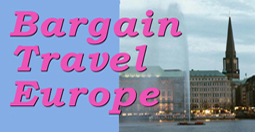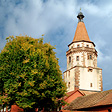WINE MUSEUM STUTTGART - UHLBACH
Vine Culture and Trails in the City of Wine
 The
southwest of Germany is covered in wine vineyards, from the Black Forest
and Upper Rhine Valley to the
Neckar River, but you needn’t stray
far from Stuttgart for the wine trail experience, in fact, the vines
of the city owned vineyards are evident within the city itself and the
suburban
villages within easy reach, earning the nickname the “wine city”.
In the beginning of the 12th Century a monk named Ulrich granted vineyards
in around Stuttgart to the Blaubeuren Abbey Monastery. By the 17th Century,
the city and its surroundings were the third largest wine producing region
in the Holy Roman Empire of German kings. Wine grape growing among the
city’s five official wine grape growing cooperatives remained one
of the city's principal sources of income right up into the 19th Century.
Stuttgart still owns its own vineyards along with five wine producing
cooperatives and private wine makers. The wine grapes produced are most
commonly the
regional reds, Trollinger and Lemberger, along with Pinot Noir, but white
wines like Pinot Blanc, Pinot Gris, Riesling, Rivaner, white Burgundy and
Traminer are also produced in the vineyards.
The
southwest of Germany is covered in wine vineyards, from the Black Forest
and Upper Rhine Valley to the
Neckar River, but you needn’t stray
far from Stuttgart for the wine trail experience, in fact, the vines
of the city owned vineyards are evident within the city itself and the
suburban
villages within easy reach, earning the nickname the “wine city”.
In the beginning of the 12th Century a monk named Ulrich granted vineyards
in around Stuttgart to the Blaubeuren Abbey Monastery. By the 17th Century,
the city and its surroundings were the third largest wine producing region
in the Holy Roman Empire of German kings. Wine grape growing among the
city’s five official wine grape growing cooperatives remained one
of the city's principal sources of income right up into the 19th Century.
Stuttgart still owns its own vineyards along with five wine producing
cooperatives and private wine makers. The wine grapes produced are most
commonly the
regional reds, Trollinger and Lemberger, along with Pinot Noir, but white
wines like Pinot Blanc, Pinot Gris, Riesling, Rivaner, white Burgundy and
Traminer are also produced in the vineyards.
 The Uhlbach village suburb east of Stuttgart near Esslingen has been
a tourist destination since the early 1800s for its wine making center
and starting
point of a stroll along the wine paths. The museum in the former grape
pressing building dating back 400 years presents the story of wine-growing
in Baden-Württemberg, with the heavy timbers of old wine presses,
ornately carved wine barrels, a collection of glasses, clay and stoneware
goblets, glass and pewter wine vessels in use since the days of the Romans,
along with certificates and maps of the Stuttgarter vineyards and wine
history, elaborate wooden reliefs depicting the wine grower’s life
and even a corkscrew collection. After a view of the museum exhibits,
guests can sit to sample the charms of the wines of Stuttgart in the
on-the-premises "Weinstüble",
including two wines from each of the seven Stuttgart wine growing cooperatives
and Stuttgart city owned estate.
The Uhlbach village suburb east of Stuttgart near Esslingen has been
a tourist destination since the early 1800s for its wine making center
and starting
point of a stroll along the wine paths. The museum in the former grape
pressing building dating back 400 years presents the story of wine-growing
in Baden-Württemberg, with the heavy timbers of old wine presses,
ornately carved wine barrels, a collection of glasses, clay and stoneware
goblets, glass and pewter wine vessels in use since the days of the Romans,
along with certificates and maps of the Stuttgarter vineyards and wine
history, elaborate wooden reliefs depicting the wine grower’s life
and even a corkscrew collection. After a view of the museum exhibits,
guests can sit to sample the charms of the wines of Stuttgart in the
on-the-premises "Weinstüble",
including two wines from each of the seven Stuttgart wine growing cooperatives
and Stuttgart city owned estate.
 The Stuttgarter Wine Paths, the "Weinwanderweg" consisting of
four different trails lead along picturesque hillsides, overlooking the
city and Neckar hills viewpoints, dotted with local grape harvest restaurants,
the "Besen", where a traditional broom hung above the door announces
that winegrowers offer their own wine for sale. At the end of August and
early September, the Stuttgart Wine Village Festival “Stuttgarter
Weindorf” is held in the city center Schiller Square where 250 of
the local “broom” wine growers bring their best harvests for
lovers of wine to gather and tip the famous quarter liter “ein Viertele
zu schlotzen" of wine in the tradition of market days of the past
(see Stuttgart
Festivals).
The Stuttgarter Wine Paths, the "Weinwanderweg" consisting of
four different trails lead along picturesque hillsides, overlooking the
city and Neckar hills viewpoints, dotted with local grape harvest restaurants,
the "Besen", where a traditional broom hung above the door announces
that winegrowers offer their own wine for sale. At the end of August and
early September, the Stuttgart Wine Village Festival “Stuttgarter
Weindorf” is held in the city center Schiller Square where 250 of
the local “broom” wine growers bring their best harvests for
lovers of wine to gather and tip the famous quarter liter “ein Viertele
zu schlotzen" of wine in the tradition of market days of the past
(see Stuttgart
Festivals).
Visiting the Wine Museum Uhlbach-Stuttgart
 The
wine culture museum (Weinbaumuseum) in Ulbach is open from March to November,
Saturday 2pm to 6pm, Sundays and Holidays
11am to 6pm. Admission is €1.50. After the
museum, follow the wine trail to the Memorial Tomb Chapel “Grabkapelle” of
Catherine of Württemberg, a modest uphill hike or stop for a wine
lunch with a traditional Swabian flair at the Löwen Wienstube
in Uhlbach. Aside from the wine museum, the small town center features
the
half-timber
town hall built in 1612, about the same era as the wine museum building,
and St Andrews Church in the late gothic German style dating from 1490,
with a little cemetery behind it worth a look. © Bargain
Travel Europe
The
wine culture museum (Weinbaumuseum) in Ulbach is open from March to November,
Saturday 2pm to 6pm, Sundays and Holidays
11am to 6pm. Admission is €1.50. After the
museum, follow the wine trail to the Memorial Tomb Chapel “Grabkapelle” of
Catherine of Württemberg, a modest uphill hike or stop for a wine
lunch with a traditional Swabian flair at the Löwen Wienstube
in Uhlbach. Aside from the wine museum, the small town center features
the
half-timber
town hall built in 1612, about the same era as the wine museum building,
and St Andrews Church in the late gothic German style dating from 1490,
with a little cemetery behind it worth a look. © Bargain
Travel Europe
Compare best hotel and travel deals in Stuttgart
on TripAdvisor
Web Info
Weinbaumuseum
Stuttgart Tourism
These articles are copyrighted and the sole property of Bargain Travel Europe and WLPV, LLC. and may not be copied or reprinted without permission.
See Also:
STUTTGART
MUSEUMS
GERMAN INTERCITY EXPRESS TRAIN – ICE


